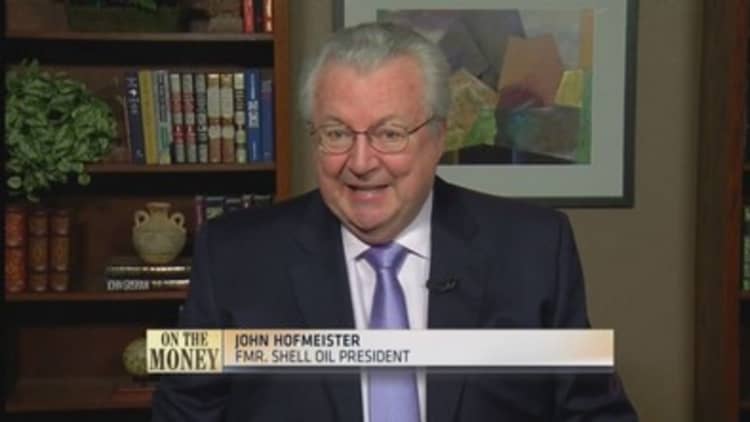
Enjoying those prices at the pump? You might not want to get used to them. A former top oil executive says the price of gas at the pump could double by the end of the year.
In an interview with CNBC, former Shell Oil President John Hofmeister predicts that U.S. oil could skyrocket from the current levels under $48 a barrel to $80 by this fall, just as consumers are getting used to the windfall from lower gas prices. That would force gas prices to double, from the current $2 to a whopping $4 by next winter.
The reason, he says, is the oil companies are masters of the simple economics of supply and demand.
"The industry is the best in the world at cutting costs when they have to reduce spending. What's happening is we're shutting down drilling rigs," Hofmeister said. "Not completing the wells that have just been drilled. And we're going to eat off the surplus oil out there probably by mid-year."
Read MoreFuel is cheaper, so let's hike gas tax: Former governor
Hofmeister, who ran Shell Oil USA from 2005-08, retired and founded Citizens for Affordable Energy. The non-profit organization seeks the growth of natural gas as a transportation fuel alternative to oil.
He says U.S. producers have idled 500 rigs over the past four months as oil prices plunged. He says the result of that production slowdown eventually will be felt at the pump. This month, Baker Hughes reported that U.S. drillers had taken a record number of oil rigs out of service amid the price slump. Last week alone, oil rig counts tumbled by 55 to 1,366.
Five dollar a gallon gas?
Hofmeister predicts gas prices could pass the $3-a-gallon range in September and October. By December and next January, he says, gas prices will be nearing $4 a gallon.
Looking further into the future, the former oil exec sees prices rising to "$5 gasoline in the U.S. as we approach the end of the decade."
Although the Republican-controlled Senate passed the Keystone XL pipeline this week, Washington observers say President Barack Obama is certain to veto it.
Read MoreSenate passes final Keystone bill: measure faces Obama veto
Hofmeister says the Keystone XL pipeline will have no impact on fuel prices in the near term. And he tells CNBC he doesn't expect it to pass during Obama's tenure.
"Whoever is the next president, Democratic or Republican, must look at the needs of the nation 20 to 30 years down the road," he added.
While still a fossil fuel, natural gas has half of the carbon in the molecule that an oil molecule has, Hofmeister explained. "It's a reduction in fossil fuel emissions, or carbon emissions, by switching to natural gas."
Hofmeister sees natural gas being turned into four types of alternative fuels. "You can have ethanol and methanol for passenger cars," he said. "CNG (compressed natural gas) and LNG (liquefied natural gas) for trucks and trains. Natgas "takes the pressure off oil. And it also ends the need for the U.S. to import oil."
Hofmeister says that unless the U.S. reduces oil consumption, "we will face inevitable and perpetual volatility in oil, especially as we approach the end of the decade."
On the Money airs on CNBC Sundays at 7:30 pm, or check listings for air times in local markets.




